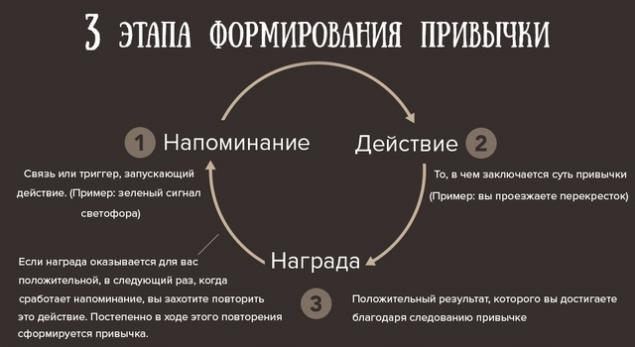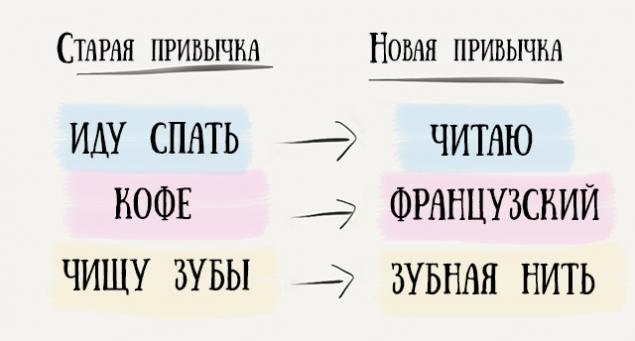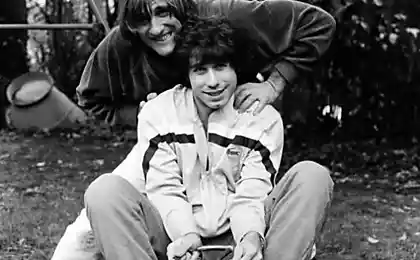791
As I became an early riser, I learn a new language and read 5 times more books for the year
Site publishes an impressive article Belle Beth Cooper. This girl, the co-founder of the Australian startup Hello Code, found a stunningly easy way to develop the necessary habits. And now she tells us how she did it, and what to do. You may have noticed that the title for this article, I came up with quite an impressive (at least I hope so!). But the truly amazing thing is that to achieve such an impressive result is not so difficult as it seems initially. In fact, all of the results achieved by the repetition of small cases each day for a long time.
I'm a big fan of a reasonable approach to work and find ways to make their work more efficient. For two years I was able to discover and try out a lot of these tricks.
Today I'll show you how to reach these goals by 2015.
The habit devote 5 minutes each day to the study of the French led me to the fact that today I can read, write, and speak at a basic level . The habit of reading just one page every night helped me to increase the list of books read 5 times over the past two years.
in general, I used small daily habits to obtain significant and long-term results.
Below I will discuss four main principles that guided me when I try to develop a new habit. These principles work every time and with any business, for which I have neither taken.
1. Start small: Spend a bit of time to one and the same case every denKogda few years ago, I first decided to develop habits for a healthier lifestyle, one of my biggest mistakes was that I demanded too much from yourself
To begin with attempts to read a book a week after I had read almost all. Or get up every morning to 6 hours after a long time stable woke around 9.
The gap between where I started and what I wanted to achieve, was so huge that the time for again I failed. And every failure day after day doing these attempts more difficult.
Habits need to get into a routine.

And so actually I needed small victories every day, and visible progress, in order to create an updated schedule, which I could stick to it every day.
Finally, I had the idea to start small. The gist of it is to concentrate on the repetition of the habit every day, and not on how well you do it. In other words, first you need to think about the quantity, but the quality will come later.
A perfect example is the use of dental floss. Let's say you decide to do it every night, although he had for years do not pay attention. If suddenly, for no reason at all you take a thread and become every evening to spend on brushing your teeth for about ten minutes, you are unlikely to be enough for more than a week. This is really big question
But the ability to start small like giving you superpowers This is as it should be done with dental floss:.. You choose the most insignificant part of the habit, which is to perform will have no labor. In this case, it is possible to start with only one tooth cleaning. There is already deemed to have used a thread, but in this case you do not have to make any great effort in the field of oral hygiene
Here's how it works:. you initially focus on brushing one tooth every night. You do it for one week without interruption. Then two, three, four. You is not hard to stick to this habit, because it is so easy. Clean one tooth a day does not make absolutely no difficulty, so it is quite difficult to come up with an excuse not to do so. And when will the habit into your daily routine, and you'll do it without reminders, start to brush two teeth.

Do this every night for some time. Then go to three. And so gradually you're going to do more and more without making really drastic and severe changes in his life.
Start small - so the first thing to take care of bringing their actions to automatism, and only then think about how hard you need to do anything to achieve the result
. As noted by blogger Scott Young, we often overestimate themselves - especially when we start to do something unusual. For a more realistic look at the possibilities, Scott advises to expect that we can give the case only 20% of the time and energy that we would like to spend.
That's how I applied the principle of "start small" to their habits in 2015:
Reading: one page for the evening began to read all on one page of the book before going to bed every night. Quite often I could read more, but even if it was just one page, I believe the day is lived successfully.

Later, when reading quite firmly established in my schedule, I began to read for 15 minutes, and then gradually entered the result in 30 minutes of reading before going to bed and read for 30 minutes in the morning in most cases.
Reading one page per day bore fruit: in 2013 I read 7 books. During 2014 - 22 books. 2015 - 33 of the book. Almost five times more than what I read in 2013.
On production of this habit, I took about a year and a half. It may seem that this is a very long time, but in fact it has flown by rather quickly
When I'm working on the elaboration of habit, all of what I think -. This is how much I need to read today that day was not in vain. need to Concentrate on what to do on that particular day. But if you look back, you realize how significant result given the daily efforts
French:. One lesson every morning before the French engaged from time to time, but it was not constant. When I decided that I need to improve knowledge of the language, I started with the performance of just one lesson in Duolingo for coffee every morning. (If you have not experienced it before, Duolingo - is a free web and mobile application for learning languages)
. Perform one lesson takes about five minutes, so it's a small thing to do that I was not difficult, for example, for morning coffee. Over time, I began to do more than one lesson - two, three, sometimes four or five, if I particularly liked
I've done as much as I wanted, but at least one lesson anyway. .
In order to consider the matter made every day, we had to go through just one lesson, and it is easy, even in the days when you did not do more set. Now I have started to use more and Babbel (another application for the study of languages, but paid), to better understand the intricacies of French grammar. French course I graduated in Duolingo.
According to statistics in Duolingo I studied French for about 41%. Not a bad result after just five minutes a day!
2. Work only on one habit odnovremennoOdnoy of the most difficult problems in the development of habits for me was the desire to take on too much. I always build such grand plans for the development of a lot of things and start with such enthusiasm that I want to do multiple habits at once.
Every time, when I started in this way, in the end nothing came of it. Often, several of the selected habits do not remain in your life, it happens - not one of them. It's just too hard - like multitasking, when the brain has to constantly switch between tasks, because he can not concentrate on several things simultaneously
. So I picked up a new rule - produce only one habit at a time. Only when this habit is brought to automatism, and I is not difficult to do something every day, I take up my new workout.
If we talk about my case, I became involved in the French only when learned to read every night. And when I began to carry on a French lesson every day, I began to think about how to learn to wake up earlier.

Sometimes the development of new habits can take a long time. I really was hard to get used to regularly wake up early. About four months later I was focused on one and the same action, tried different techniques to monitor progress and discuss it with friends, help me to keep myself under control. I was focused on the development of a habit, and so the whole time I was taken for something new.
Today, I am glad that gave develop this habit for so long, because I is not difficult to wake up early every day. It was not easy, but it was worth it.
The time required to establish a particular habits may vary. Probably everyone knows the theory that the production habit takes 21 days, but recent studies have shown that this period is unique to each person. Another study proved that it takes 66 days - about two months
. I realized that I need to work on each habit alone, giving it their full attention and energy, and look to each habit a unique approach.
3. Eliminate obstacles: let everything you need will be on rukoyDlya me much easier to comply with the habit, if all you need for this is under my hand. For example, perform one French lesson for a cup of coffee is much easier if you have a smartphone is nearby. Or stick to the habit of reading a page every night easier, if the book is already lying beside the bed.
Canadian journalist and sociologist Malcolm Gladwell calls this the turning point. This is a small change that allows you to stop coming up with excuses and start acting. One of the most vivid stories that show the effectiveness of a turning point occurred in the course of study at the University of tetanus. The aim of the study was to verify whether the stories help students about the grave consequences of tetanus increase the number of those wishing to be vaccinated against the disease. Scary stories about the consequences of the disease did not give any effect, but one amazing thing helped: after the campus of the University placed a map showing the medical center and its mode of operation, the number of students vaccinated increased from 3% to 28%
Overcoming the breaking point allows you to proceed with the action you are likely to finish before the end. I like to think that in this way I eliminate obstacles that contribute to the non-fulfillment of my habits.
In 2016, I plan to start working on a new habit - often play the piano. Now I'm doing this for the mood, but not on a regular basis to improve their game. I noticed that I often want to sit to play if the piano is nearby. More recently, it is in the corner of our living room (and dining room and kitchen in combination), so I is not difficult to sit down and play for a while, until the food is cooked, or on the way to the kitchen for a snack.

Another habit that I want to take the time this year, it is more likely to engage in sports. I noticed that if I wear for training, most likely, I will go out of the house for a jog. If I wear something else, I'm getting a lot easier to come up with reasons not to make this run. I'd rather get out of the house if prepare sportswear in the evening and in the morning quickly wear it until my brain is not began to invent reasons to postpone the training. When I'll take care of the elaboration of this habit, you'll be more likely to resort to this reception.
4. Combine habits: Create new habits based on the already imeyuschihsyaOdnim of my favorite ways to develop their habits is a "superstructure" of existing. This helps to build a few habits in the daily routine, and while some habits serve as a trigger for others.
The advantage of this method is that you already have a lot of habits, you just are not thinking about them. Brushing your teeth before going to bed, get out of bed in the morning, make coffee at the same time every day - all this is a habit. < All what you are doing about the same time every day without thinking is a habit, which can bind the other.
If you are a new habit after the already familiar action force of the old habits can be used for the regular performance of the new. For example, when I wake up, the first thing I go down to the kitchen and brew some coffee. As soon as my coffee is ready, it's time the French lesson. My old habit to make coffee acts as a trigger for the study of French.
Likewise, when in the evening I go to bed, I'll take the book. My habit of reading before going to bed is started automatically when I go to bed and see the book.

Studies show that the construction of links between the already well-established daily routine and a new habit can be the best way to preserve it in the long run. When you build on one habit for another, you build connections between new and already well-established acts.
You can take advantage of their existing habits gradually nadstraivaya new on them.
For me to develop new habits become a kind of hobby. I like to think about all the skills that I can learn and develop, giving them just a little bit of time each day. This realization makes significant results are more achievable.
via medium.com/social-media-tips/how-i-became-a-morning-person-learned-a-new-language-and-read-5x-more-books-in-2015-867ed067bb9#.cmdczjgta
I'm a big fan of a reasonable approach to work and find ways to make their work more efficient. For two years I was able to discover and try out a lot of these tricks.
Today I'll show you how to reach these goals by 2015.
The habit devote 5 minutes each day to the study of the French led me to the fact that today I can read, write, and speak at a basic level . The habit of reading just one page every night helped me to increase the list of books read 5 times over the past two years.

in general, I used small daily habits to obtain significant and long-term results.
Below I will discuss four main principles that guided me when I try to develop a new habit. These principles work every time and with any business, for which I have neither taken.
1. Start small: Spend a bit of time to one and the same case every denKogda few years ago, I first decided to develop habits for a healthier lifestyle, one of my biggest mistakes was that I demanded too much from yourself
To begin with attempts to read a book a week after I had read almost all. Or get up every morning to 6 hours after a long time stable woke around 9.
The gap between where I started and what I wanted to achieve, was so huge that the time for again I failed. And every failure day after day doing these attempts more difficult.
Habits need to get into a routine.

And so actually I needed small victories every day, and visible progress, in order to create an updated schedule, which I could stick to it every day.
Finally, I had the idea to start small. The gist of it is to concentrate on the repetition of the habit every day, and not on how well you do it. In other words, first you need to think about the quantity, but the quality will come later.
A perfect example is the use of dental floss. Let's say you decide to do it every night, although he had for years do not pay attention. If suddenly, for no reason at all you take a thread and become every evening to spend on brushing your teeth for about ten minutes, you are unlikely to be enough for more than a week. This is really big question
But the ability to start small like giving you superpowers This is as it should be done with dental floss:.. You choose the most insignificant part of the habit, which is to perform will have no labor. In this case, it is possible to start with only one tooth cleaning. There is already deemed to have used a thread, but in this case you do not have to make any great effort in the field of oral hygiene
Here's how it works:. you initially focus on brushing one tooth every night. You do it for one week without interruption. Then two, three, four. You is not hard to stick to this habit, because it is so easy. Clean one tooth a day does not make absolutely no difficulty, so it is quite difficult to come up with an excuse not to do so. And when will the habit into your daily routine, and you'll do it without reminders, start to brush two teeth.

Do this every night for some time. Then go to three. And so gradually you're going to do more and more without making really drastic and severe changes in his life.
Start small - so the first thing to take care of bringing their actions to automatism, and only then think about how hard you need to do anything to achieve the result
. As noted by blogger Scott Young, we often overestimate themselves - especially when we start to do something unusual. For a more realistic look at the possibilities, Scott advises to expect that we can give the case only 20% of the time and energy that we would like to spend.
That's how I applied the principle of "start small" to their habits in 2015:
Reading: one page for the evening began to read all on one page of the book before going to bed every night. Quite often I could read more, but even if it was just one page, I believe the day is lived successfully.

Later, when reading quite firmly established in my schedule, I began to read for 15 minutes, and then gradually entered the result in 30 minutes of reading before going to bed and read for 30 minutes in the morning in most cases.
Reading one page per day bore fruit: in 2013 I read 7 books. During 2014 - 22 books. 2015 - 33 of the book. Almost five times more than what I read in 2013.
On production of this habit, I took about a year and a half. It may seem that this is a very long time, but in fact it has flown by rather quickly
When I'm working on the elaboration of habit, all of what I think -. This is how much I need to read today that day was not in vain. need to Concentrate on what to do on that particular day. But if you look back, you realize how significant result given the daily efforts
French:. One lesson every morning before the French engaged from time to time, but it was not constant. When I decided that I need to improve knowledge of the language, I started with the performance of just one lesson in Duolingo for coffee every morning. (If you have not experienced it before, Duolingo - is a free web and mobile application for learning languages)
. Perform one lesson takes about five minutes, so it's a small thing to do that I was not difficult, for example, for morning coffee. Over time, I began to do more than one lesson - two, three, sometimes four or five, if I particularly liked
I've done as much as I wanted, but at least one lesson anyway. .
In order to consider the matter made every day, we had to go through just one lesson, and it is easy, even in the days when you did not do more set. Now I have started to use more and Babbel (another application for the study of languages, but paid), to better understand the intricacies of French grammar. French course I graduated in Duolingo.
According to statistics in Duolingo I studied French for about 41%. Not a bad result after just five minutes a day!
2. Work only on one habit odnovremennoOdnoy of the most difficult problems in the development of habits for me was the desire to take on too much. I always build such grand plans for the development of a lot of things and start with such enthusiasm that I want to do multiple habits at once.
Every time, when I started in this way, in the end nothing came of it. Often, several of the selected habits do not remain in your life, it happens - not one of them. It's just too hard - like multitasking, when the brain has to constantly switch between tasks, because he can not concentrate on several things simultaneously
. So I picked up a new rule - produce only one habit at a time. Only when this habit is brought to automatism, and I is not difficult to do something every day, I take up my new workout.
If we talk about my case, I became involved in the French only when learned to read every night. And when I began to carry on a French lesson every day, I began to think about how to learn to wake up earlier.

Sometimes the development of new habits can take a long time. I really was hard to get used to regularly wake up early. About four months later I was focused on one and the same action, tried different techniques to monitor progress and discuss it with friends, help me to keep myself under control. I was focused on the development of a habit, and so the whole time I was taken for something new.
Today, I am glad that gave develop this habit for so long, because I is not difficult to wake up early every day. It was not easy, but it was worth it.
The time required to establish a particular habits may vary. Probably everyone knows the theory that the production habit takes 21 days, but recent studies have shown that this period is unique to each person. Another study proved that it takes 66 days - about two months
. I realized that I need to work on each habit alone, giving it their full attention and energy, and look to each habit a unique approach.
3. Eliminate obstacles: let everything you need will be on rukoyDlya me much easier to comply with the habit, if all you need for this is under my hand. For example, perform one French lesson for a cup of coffee is much easier if you have a smartphone is nearby. Or stick to the habit of reading a page every night easier, if the book is already lying beside the bed.
Canadian journalist and sociologist Malcolm Gladwell calls this the turning point. This is a small change that allows you to stop coming up with excuses and start acting. One of the most vivid stories that show the effectiveness of a turning point occurred in the course of study at the University of tetanus. The aim of the study was to verify whether the stories help students about the grave consequences of tetanus increase the number of those wishing to be vaccinated against the disease. Scary stories about the consequences of the disease did not give any effect, but one amazing thing helped: after the campus of the University placed a map showing the medical center and its mode of operation, the number of students vaccinated increased from 3% to 28%
Overcoming the breaking point allows you to proceed with the action you are likely to finish before the end. I like to think that in this way I eliminate obstacles that contribute to the non-fulfillment of my habits.
In 2016, I plan to start working on a new habit - often play the piano. Now I'm doing this for the mood, but not on a regular basis to improve their game. I noticed that I often want to sit to play if the piano is nearby. More recently, it is in the corner of our living room (and dining room and kitchen in combination), so I is not difficult to sit down and play for a while, until the food is cooked, or on the way to the kitchen for a snack.

Another habit that I want to take the time this year, it is more likely to engage in sports. I noticed that if I wear for training, most likely, I will go out of the house for a jog. If I wear something else, I'm getting a lot easier to come up with reasons not to make this run. I'd rather get out of the house if prepare sportswear in the evening and in the morning quickly wear it until my brain is not began to invent reasons to postpone the training. When I'll take care of the elaboration of this habit, you'll be more likely to resort to this reception.
4. Combine habits: Create new habits based on the already imeyuschihsyaOdnim of my favorite ways to develop their habits is a "superstructure" of existing. This helps to build a few habits in the daily routine, and while some habits serve as a trigger for others.
The advantage of this method is that you already have a lot of habits, you just are not thinking about them. Brushing your teeth before going to bed, get out of bed in the morning, make coffee at the same time every day - all this is a habit. < All what you are doing about the same time every day without thinking is a habit, which can bind the other.
If you are a new habit after the already familiar action force of the old habits can be used for the regular performance of the new. For example, when I wake up, the first thing I go down to the kitchen and brew some coffee. As soon as my coffee is ready, it's time the French lesson. My old habit to make coffee acts as a trigger for the study of French.
Likewise, when in the evening I go to bed, I'll take the book. My habit of reading before going to bed is started automatically when I go to bed and see the book.

Studies show that the construction of links between the already well-established daily routine and a new habit can be the best way to preserve it in the long run. When you build on one habit for another, you build connections between new and already well-established acts.
You can take advantage of their existing habits gradually nadstraivaya new on them.
For me to develop new habits become a kind of hobby. I like to think about all the skills that I can learn and develop, giving them just a little bit of time each day. This realization makes significant results are more achievable.
via medium.com/social-media-tips/how-i-became-a-morning-person-learned-a-new-language-and-read-5x-more-books-in-2015-867ed067bb9#.cmdczjgta
10 books so fascinating that you will forget about everything
Washed and offended: 8 cats, to take a bath























